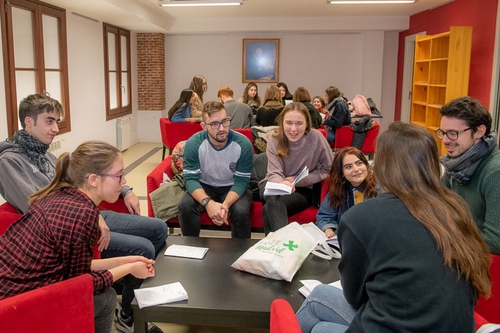Commented Bible Passages
December
To the angel of the church in Laodicea write: These are the words of the Amen, the faithful and true witness, the ruler of God’s creation. I know your deeds, that you are neither cold nor hot. I wish you were either one or the other! So, because you are lukewarm—neither hot nor cold—I am about to spit you out of my mouth. You say, “I am rich; I have acquired wealth and do not need a thing.” But you do not realize that you are wretched, pitiful, poor, blind and naked. I counsel you to buy from me gold refined in the fire, so you can become rich; and white clothes to wear, so you can cover your shameful nakedness; and salve to put on your eyes, so you can see. Those whom I love I rebuke and discipline. So be earnest, and repent. Here I am! I stand at the door and knock. If anyone hears my voice and opens the door, I will come in and eat with them, and they with me. To those who are victorious, I will give the right to sit with me on my throne, just as I was victorious and sat down with my Father on his throne. Whoever has ears, let them hear what the Spirit says to the churches. (Revelation 3:14-22)
In the final message of the seven sent by Saint John to the Christians of Asia Minor, the Risen Christ refers to himself as the “Amen”, in other words God’s definitive “yes” to human beings as well as humanity’s “yes” to God in return (see 2 Corinthians 1:19-20). But he speaks to a community that is not living this “yes” fully. Like the water supply to the city, believers are neither cold nor hot; they are self-satisfied and living in spiritual mediocrity. Christ’s warning seems tailor-made for a society like ours, where so many possibilities present themselves to us that we are in danger of forgetting what really matters, of flitting from one thing to another rather than making deep and long-term commitments.
At the same time, and paradoxically, the Christians of Laodicea have a self-image which is over-inflated; they think that they have already “arrived”. Christ tells them that in fact they have nothing. He does not say this in order to condemn them, but rather to incite them to ask for what they are lacking. For if God gives freely to those who come to him with open hands, this means that as a prerequisite we have to become aware of our need. Those who are too full of what they think they have acquired make themselves unfit to welcome God’s gifts (see Luke 18:9-14). Here as well the author makes implicit reference to the characteristics of the city of Laodicea, a financial center with a textile industry and a hospital to treat diseases of the eye.
Next, Christ explains the reasons for his criticisms by a proverb similar to those found in many civilizations. The Old Testament offers one example: “The Lord disciplines those he loves, as a father the son he delights in” (Proverbs 3:12). Parents who wish a full life for their little children cannot give in to all their desires; sometimes they have to set limits. Similarly, though Christ is always “yes”, we must realize that sometimes that “yes” is expressed by a “no” to harmful forms of behavior.
The message concludes with two impressive promises. God never forces us to accept him because he desires a relationship of love, and no one can be obliged to give or receive love. Like a poor man, he keeps knocking at the door of our heart. When we open the door, he offers to share his own life with us intimately, expressed by the classical image of the banquet but here transposed into a one-on-one relationship. And finally, he promises that those who remain faithful will occupy his own place and share his own authority, just as he takes the place of the one he calls “Father”. A Christian is thus called to become an alter Christus, another Christ, in the fullness of a communion with his or her Lord.
![]() In what ways are we “neither cold nor hot”? How can we rediscover enthusiasm and vitality in our faith, both as individuals and as communities?
In what ways are we “neither cold nor hot”? How can we rediscover enthusiasm and vitality in our faith, both as individuals and as communities?
![]() What negative experiences have helped me to grow spiritually? Have I ever felt that my inner poverty was transformed by God’s presence?
What negative experiences have helped me to grow spiritually? Have I ever felt that my inner poverty was transformed by God’s presence?
![]() What can we do to open the doors of our heart to Christ?
What can we do to open the doors of our heart to Christ?
 TAIZÉ
TAIZÉ